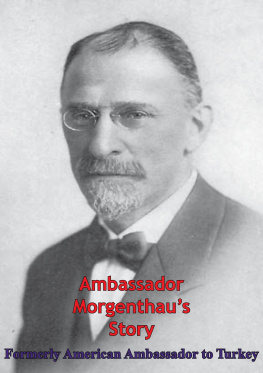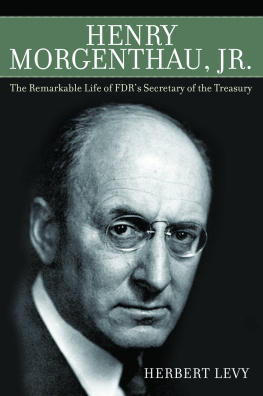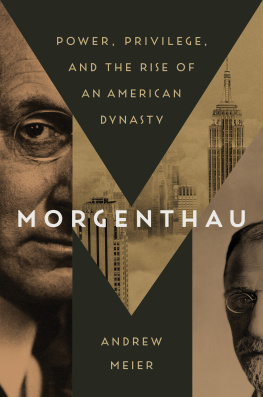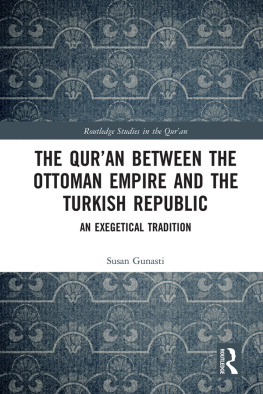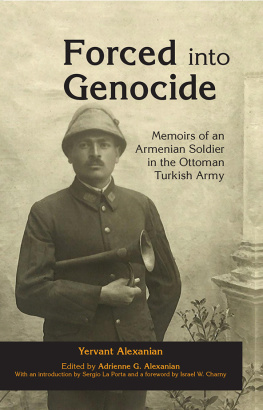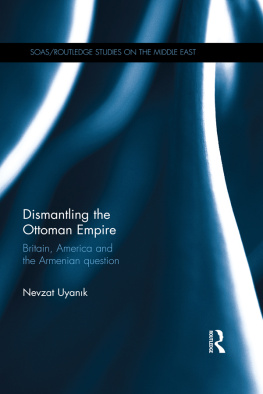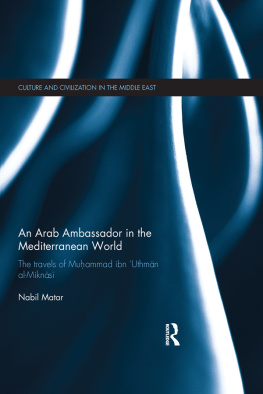

This edition is published by PICKLE PARTNERS PUBLISHING www.picklepartnerspublishing.com
To join our mailing list for new titles or for issues with our books
Or on Facebook
Text originally published in 1919 under the same title.
Pickle Partners Publishing 2013, all rights reserved. No part of this publication may be reproduced, stored in a retrieval system or transmitted by any means, electrical, mechanical or otherwise without the written permission of the copyright holder.
Publishers Note
Although in most cases we have retained the Authors original spelling and grammar to authentically reproduce the work of the Author and the original intent of such material, some additional notes and clarifications have been added for the modern readers benefit.
We have also made every effort to include all maps and illustrations of the original edition the limitations of formatting do not allow of including larger maps, we will upload as many of these maps as possible.
AMBASSADOR MORGENTHAUS STORY
Formerly American Ambassador to Turkey
ILLUSTRATED
TABLE OF CONTENTS
Contents
DEDICATION
TO
WOODROW WILSON
THE EXPONENT IN AMERICA OF THE ENLIGHTENED PUBLIC OPINION OF THE WORLD, WHICH HAS DECREED THAT THE RIGHTS OF SMALL NATIONS SHALL BE RESPECTED AND THAT SUCH CRIMES AS ARE DESCRIBED IN THIS BOOK SHALL NEVER AGAIN DARKEN THE PAGES OF HISTORY
PREFACE
By this time the American people have probably become convinced that the Germans deliberately planned the conquest of the world. Yet they hesitate to convict on circumstantial evidence and for this reason all eye witnesses to this, the greatest crime in modern history, should volunteer their testimony.
I have therefore laid aside any scruples I had as to the propriety of disclosing to my fellow countrymen the facts which I learned while representing them in Turkey. I acquired this knowledge as the servant of the American people, and it is their property as much as it is mine.
I greatly regret that I have been obliged to omit an account of the splendid activities of the American Missionary and Educational Institutions in Turkey, but to do justice to this subject would require a book by itself. I have had to omit the story of the Jews in Turkey for the same reasons.
My thanks are due to my friend, Mr. Burton J. Hendrick, for the invaluable assistance he has rendered in the preparation of the book.
HENRY MORGENTHAU.
October, 1918.

Fig. 1 . HENRY I MORGENTHAU, American Ambassador at Constantinople from 1913 to 1916
CHAPTER I A GERMAN SUPERMAN AT CONSTANTINOPLE
When I began writing these reminiscences of my ambassadorship, Germanys schemes in the Turkish Empire and the Near East seemed to have achieved a temporary success. The Central Powers had apparently disintegrated Russia, transformed the Baltic and the Black seas into German lakes, and had obtained a new route to the East by way of the Caucasus. For the time being Germany dominated Serbia, Bulgaria, Rumania, and Turkey, and regarded her aspirations for a new Teutonic Empire, extending from the North Sea to the Persian Gulf, as practically realized. The world now knows, though it did not clearly understand this fact in 1914, that Germany precipitated the war to destroy Serbia, seize control of the Balkan nations, transform Turkey into a vassal state, and thus obtain a huge oriental empire that would form the basis for unlimited world dominion. Did these German aggressions in the East mean that this extensive programme had succeeded?
As I picture to myself a map which would show Germanys military and diplomatic triumphs, my experiences in Constantinople take on a new meaning.
I now see the events of those twenty-six months as part of a connected, definite story. The several individuals that moved upon the scene now appear as players in a carefully staged, superbly managed drama. I see clearly enough now that Germany had made all her plans for world dominion and that the country to which I had been sent as American Ambassador was one of the foundation stones of the Kaisers whole political and military structure. Had Germany not acquired control of Constantinople in the early days of the war, it is not unlikely that hostilities would have ended a few months after the Battle of the Marne. It was certainly an amazing fate that landed me in this great headquarters of intrigue at the very moment when the plans of the Kaiser for controlling Turkey, which he had carefully pursued for a quarter of a century, were about to achieve their final success.
For this work of subjugating Turkey, and transforming its army and its territory into instruments of Germany, the Emperor had sent to Constantinople an ambassador who was ideally fitted for the task. The mere fact that the Kaiser had personally chosen Baron Von Wangenheim for this post shows that he had accurately gauged the human qualities needed in this great diplomatic enterprise.
The Kaiser had early detected in Wangenheim an instrument ideally qualified for oriental intrigue; he had more than once summoned him to Corfu for his vacations, and here, we may be sure, the two congenial spirits had passed many days discussing German ambitions in the Near East. At the time when I first met him, Wangenheim was fifty-four years old; he had spent a quarter of a century in the diplomatic corps, he had seen service in such different places as Petrograd, Copenhagen, Madrid, Athens, and Mexico, and he had been charg at Constantinople, several years afterward coming there as ambassador. He understood completely all countries, including the United States; his first wife had been an American, and Wangenheim, when Minister to Mexico, had intimately studied our country and had then acquired an admiration for our energy and progress. He had a complete technical equipment for a diplomat; .he spoke German, English, and French with equal facility, he knew the East thoroughly, and he had the widest acquaintance with public men. Physically he was one of the most imposing persons I have ever known. When I was a boy in Germany, the Fatherland was usually symbolized as a beautiful and powerful womana kind of dazzling Valkyrie; when I think of modern Germany, however, the massive, burly figure of Wangenheim naturally presents itself to my mind. He was six feet two inches tall; his huge, solid frame, his Gibraltarlike shoulders, erect and impregnable, his bold, defiant head, his piercing eyes, his whole physical structure constantly pulsating with life and activitythere stands, I would say, not the Germany which I had known, but the Germany whose limitless ambitions had transformed the world into a place of horror. And Wangenheims every act and every word typified this new and dreadful portent among the nations. Pan-Germany filled all his waking hours and directed his every action. The deification of his emperor was the only religious instinct which impelled him. That aristocratic and autocratic organization of German society which represents the Prussian system was, in Wangenheims eyes, something to be venerated and worshipped; with this as the groundwork, Germany was inevitably destined, he believed, to rule the world. The great land-owning Junker represented the perfection of mankind. I would despise myself, his closest associate once told me, and this represented Wangenheims attitude as well, if I had been born in a city Wangenheim divided mankind into two classes, the governing and the governed; and he ridiculed the idea that the upper could ever be recruited from the lower. I recall with what unction and enthusiasm he used to describe the Emperors caste organization of German estates; how he had made them non-transferable, and had even arranged it so that the possessors, or the prospective possessors, could not marry without the imperial consent. In this way, Wangenheim would say, we keep our governing classes pure, unmixed of blood. Like all of his social order, Wangenheim worshipped the Prussian military system; his splendid bearing showed that he had himself served in the army, and, in true German fashion, he regarded practically every situation in life from a military standpoint. I had one curious illustration of this when I asked Wangenheim one day why the Kaiser did not visit the United States. He would like to immensely, he replied, but it would be too dangerous. War might break out when he was at sea, and the enemy would capture him. I suggested that that could hardly happen as the American Government would escort its guest home with warships, and that no nation would care to run the risk of involving the United States as Germanys ally; but Wangenheim still thought that the military danger would make any such visit impossible.
Next page
